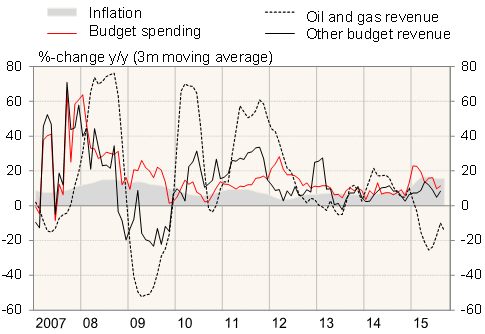BOFIT Weekly Review 44/2015
Russian government issues lean proposals for 2016 federal and state social fund budgets
In submitting its draft budgets to the Duma, the finance ministry included an estimate for total government-sector revenues (regional and local government budgets included) that anticipates a growth of around 5 % next year in nominal ruble terms. The calculations are based on the economy ministry assumptions of an inflation rate of 7.4 % next year, along with an average price of crude oil (Urals) of $50 a barrel and GDP growth of 0.7 %. Government spending is expected to increase about 2 % in nominal terms.
The finance ministry projects the government deficit next year will equal 3.8 % of GDP. The estimate includes a federal budget deficit of 3 % of GDP as laid out by president Putin.
The projected increase in federal budget revenues next year reflects changes in specialised taxes and fees. Along with changes decided earlier, the biggest revenue boost will come from revised taxes on oil production and oil exports. Adjustments in the tax on gas production, the automobile use fee, and distribution of central bank profits and income of state reserve funds are also important to bring extra revenue. Tax revenues from oil & gas, which in practice go entirely to the federal budget, should increase about 3 % after a roughly 20 % drop this year. The finance ministry expects the increase in revenues overall to be spread rather evenly across the various budget categories (federal, regional, municipal and social funds).
Change in public-sector revenues and expenditures
Source: Russian finance ministry
Federal budget spending will grow slightly faster than other categories, but still only about 4–5 % y-o-y (also excluding inter-budget transfers). Defence spending will not rise even in nominal rubles. In contrast, funds reserved for support spending (which must be decided by the president or the cabinet), as well as spending on space exploration, are likely to grow substantially. Asset transfers to the Pension Fund should rise, while transfers to regional budgets should fall slightly.
The nominal amounts of regional budget spending are expected to remain roughly unchanged next year, as well as Pension Fund and other social fund spending. To curb Pension Fund spending growth, hikes in pensions will be limited to just 4 %. The cabinet has, however, agreed on the option of a supplemental increase that will depend on the economic situation in the first half of 2016.